For the 2025 school year, there is 1 public preschool serving 465 students in Hampstead School District. This district's average pre testing ranking is 8/10, which is in the top 30% of public pre schools in New Hampshire.
Public Preschool in Hampstead School District have an average math proficiency score of 62% (versus the New Hampshire public pre school average of 44%), and reading proficiency score of 57% (versus the 47% statewide average).
Minority enrollment is 7% of the student body (majority Hispanic), which is less than the New Hampshire public preschool average of 16% (majority Hispanic).
Overview
This School District
This State (NH)
# Schools
2 Schools
149 Schools
# Students
809 Students
39,813 Students
# Teachers
74 Teachers
3,470 Teachers
Student : Teacher Ratio
11:1
11:1
District Rank
Hampstead School District, which is ranked within the top 30% of all 189 school districts in New Hampshire (based off of combined math and reading proficiency testing data) for the 2021-2022 school year.
Overall District Rank
#53 out of 189 school districts
(Top 30%)
(Top 30%)
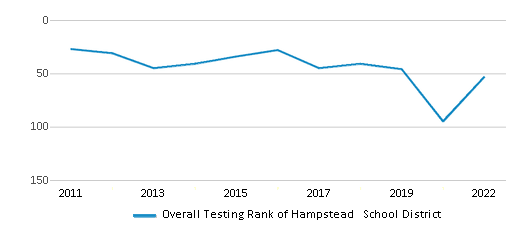
Math Test Scores (% Proficient)
50%
40%
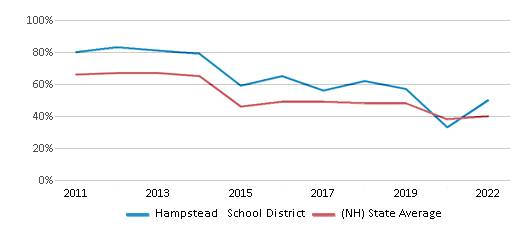
Reading/Language Arts Test Scores (% Proficient)
63%
51%
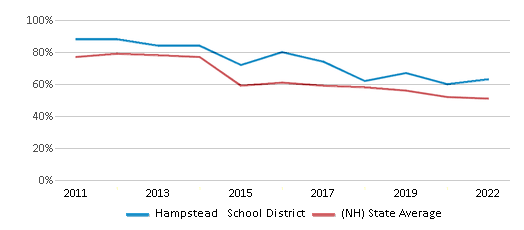
Science Test Scores (% Proficient)
40-44%
36%
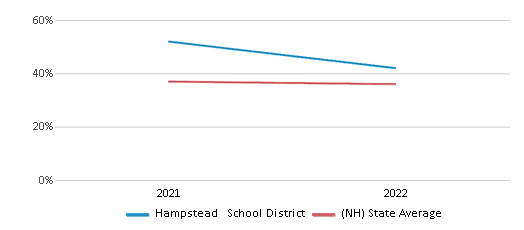
Students by Ethnicity:
Diversity Score
0.16
0.29
# American Indian Students
3 Students
71 Students
% American Indian Students
n/a
n/a
# Asian Students
6 Students
952 Students
% Asian Students
1%
3%
# Hispanic Students
37 Students
2,514 Students
% Hispanic Students
4%
6%
# Black Students
n/a
807 Students
% Black Students
n/a
2%
# White Students
742 Students
33,448 Students
% White Students
92%
84%
# Hawaiian Students
n/a
29 Students
% Hawaiian Students
n/a
n/a
# Two or more races Students
21 Students
1,992 Students
% of Two or more races Students
3%
5%
Students by Grade:
# Students in PK Grade:
32
4,442
# Students in K Grade:
72
6,330
# Students in 1st Grade:
92
6,046
# Students in 2nd Grade:
99
6,232
# Students in 3rd Grade:
77
5,421
# Students in 4th Grade:
93
5,076
# Students in 5th Grade:
67
3,284
# Students in 6th Grade:
112
1,218
# Students in 7th Grade:
83
887
# Students in 8th Grade:
82
877
# Students in 9th Grade:
-
-
# Students in 10th Grade:
-
-
# Students in 11th Grade:
-
-
# Students in 12th Grade:
-
-
# Ungraded Students:
-
-
District Revenue and Spending
The revenue/student of $34,506 is higher than the state median of $22,075. The school district revenue/student has stayed relatively flat over four school years.
The school district's spending/student of $34,319 is higher than the state median of $21,293. The school district spending/student has stayed relatively flat over four school years.
Total Revenue
$28 MM
$3,646 MM
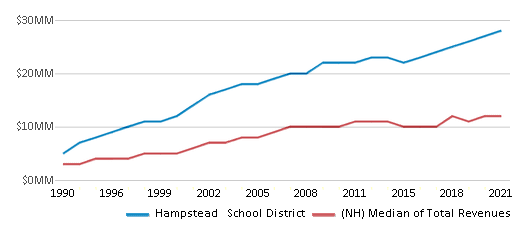
Spending
$28 MM
$3,517 MM
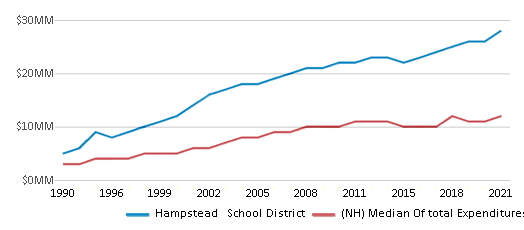
Revenue / Student
$34,506
$22,075
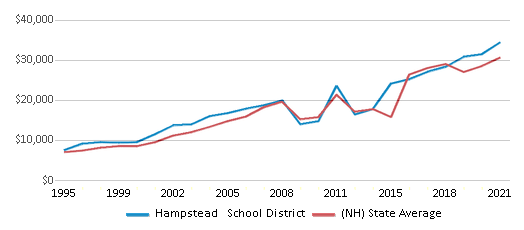
Spending / Student
$34,319
$21,293
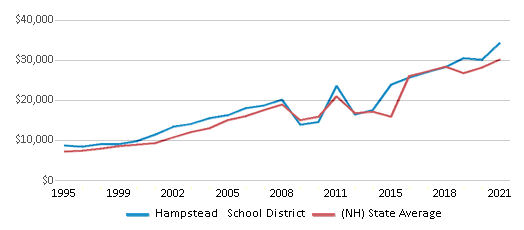
Best Hampstead School District Public Preschools (2025)
School
(Math and Reading Proficiency)
(Math and Reading Proficiency)
Location
Grades
Students
Rank: #11.
Hampstead Central School
(Math: 60-64% | Reading: 55-59%)
Rank:
Rank:
9/
Top 20%10
21 Emerson Ave.
Hampstead, NH 03841
(603) 329-6326
Hampstead, NH 03841
(603) 329-6326
Grades: PK-4
| 465 students
Recent Articles

Year-Round Or Traditional Schedule?
Which is more appropriate for your child? A year-round attendance schedule or traditional schedule? We look at the pros and cons.

Why You Should Encourage Your Child to Join a Sports Team
Participating in team sports has a great many benefits for children, there is no doubt. In this article you will learn what those benefits are.

White Students are Now the Minority in U.S. Public Schools
Increasing birth rates among immigrant families from Asia and Central and South America, combined with lower birth rates among white families, means that for the first time in history, public school students in the United States are majority-minority. This shift in demographics poses difficulties for schools as they work to accommodate children of varying language abilities and socio-economic backgrounds.





